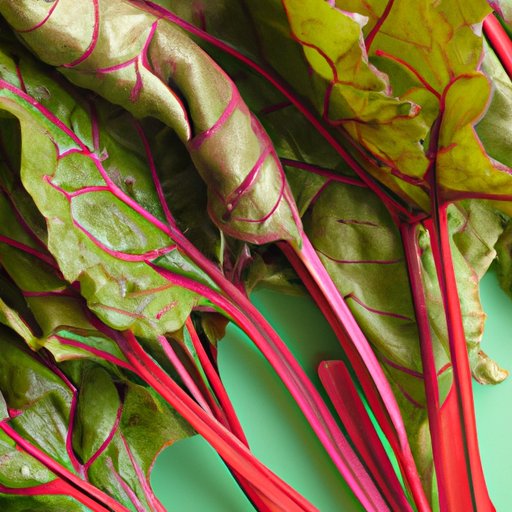
I. Introduction
Beet leaves, also known as beet greens or beet tops, are often discarded while cooking the roots. However, these greens are not only edible but also highly nutritious. In this article, we will explore the health benefits of eating beet leaves, different recipes that feature them, nutritional breakdown, ways to use them in salads, best ways to cook them, and whether they’re safe for pets.
II. The Benefits of Eating Beet Leaves: Why You Shouldn’t Toss Them Out
Beet leaves contain numerous vitamins and minerals, including vitamin A, vitamin K, iron, calcium, and fiber. They also have a high content of antioxidants, which can help protect against various diseases, including cancer. Additionally, consuming beet greens may help regulate blood pressure, boost bone health, and promote healthy digestion.
III. From Waste to Taste: Delicious Recipes Using Beet Leaves
Beet leaves can be used in a variety of recipes, ranging from appetizers to main courses. Some popular dishes include beet leaf pesto, beet leaf quiche, and beet leaf soup. To make beet leaf pesto, blend fresh beet leaves with garlic, pine nuts, parmesan cheese, and olive oil. To make beet leaf quiche, chop beet leaves finely and mix with eggs, milk, cheese, and spices. Beet leaf soup can be made by sautéing beet leaves with onions and garlic and simmering in vegetable or chicken stock until tender.
IV. Beet Leaves Nutrition: A Complete Guide to Vitamins and Minerals
One hundred grams of raw beet leaves contain approximately 21 calories, 4 grams of carbohydrates, 2 grams of protein, and 2 grams of fiber. They are also a good source of vital nutrients, such as vitamin C, vitamin A, vitamin K, iron, calcium, and magnesium. Vitamin C in beet greens helps maintain healthy skin, while vitamin A supports good vision and immune function. Vitamin K helps with blood clotting and bone health, as well as reducing the risks of heart diseases and cancer. Iron supports red blood cell production, while calcium and magnesium help maintain healthy bones.
V. Creative Ways to Use Beet Leaves in Your Salad Recipes
Adding beet leaves to your salad can give it an extra nutritional boost and add a slightly sweet and earthy flavor. You can use the beet leaves raw or sauté them lightly for a slightly tender texture. Beet leaves can be used as a substitute or added to other greens in any salad recipe, such as beet leaf salad with goat cheese, walnut, and honey mustard dressing.
VI. The Best Ways to Cook Beet Greens: Boiled, Sautéed, or Raw?
There are various methods of cooking beet leaves, including boiling, sautéing, and eating them raw. Boiling beet greens in salted water until tender, then draining and seasoning them with olive oil or butter and salt, is the most traditional way of cooking them. Sautéing them in garlic, olive oil, and spices until tender can create a flavorful side dish. Additionally, beet leaves can be eaten raw in salads, smoothies, or as a garnish for soups or stews.
VII. Can Dogs Eat Beet Leaves? A Guide to Safe and Healthy Pet Diets
Beet leaves are safe for dogs to consume in moderation. They can provide additional nutrients such as fiber, vitamin A, and antioxidants. However, always consult your vet before introducing new foods to your dog’s diet. Also, make sure the beet leaves are well-washed and cut into bite-size pieces to prevent your dog from choking.
VIII. Green Juicing: Adding Beet Leaves to Your Blend for an Extra Nutrient Boost
Green juices are an easy way to incorporate beet leaves into your diet. By blending beet leaves with other green vegetables or fruits, you can create a nutrient-dense drink that can provide you with various vitamins, minerals, and antioxidants. You can mix beet leaves with kale, spinach, cucumber, and pineapple for a delicious green smoothie.
IX. Conclusion
Beet leaves are a highly nutritious food item that should not be overlooked. They are packed with essential vitamins and minerals, fiber, and antioxidants that can help promote overall health and well-being. By incorporating beet leaves into your diet in various ways, you can enjoy their distinct flavor while also getting their full benefits.





